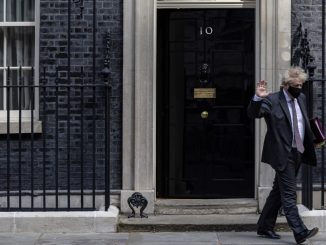

Commentary
It is said that the first casualty of war is truth.
In fact, I believe, it is memory—that indispensable advocate for historical truth—that is the first to go.
In war’s cataract, momentary crises gobble up our attention absolutely.
Last week’s bombing, yesterday’s atrocity, this morning’s defection make it difficult to keep events in perspective.
Add a media that is committed to promoting The Narrative—as distinct from reporting the facts—and who can remember how we got where we are now?
With the Abraham Accords, it seemed for a moment that Donald Trump had accomplished the impossible: peace in the Middle East.
The Biden administration had not been in power for more than a few months before the reversals set in.
Iran is the world’s largest exporter of terror. Hamas is one of its leading clients.
The incontinent rocket attacks with which Hamas besieged Israel threaten to tip over into a wider conflagration.
Meanwhile the Western press continues to behave as if Israel is responsible for the attacks against its homeland.
David Bernstein, writing at Instapundit, offered this poignant summary of Western media’s response to a typical Hamas spokesman:
“The illegitimate Zionist entity must be forced to end its occupation of all of Palestine, from Tel Aviv to Jericho. Western Reporter: So what you’re saying is that you support a peaceful two-state solution.
“We will kill the sons of pigs and apes like the great Hitler. Western reporter: So what you’re saying is that you object to right-wing Israeli politicians like Netanyahu.
“We want an Islamic state governed by sharia. Western reporter: Democracy, one-person, one-vote, religious freedom for all. Got it.
“We thank our great friends in Iran for their money, missiles, and bombs. Western Reporter: Hamas insists on being a grassroots Palestinian movement not dependent on foreign support.”
Satire or documentary? It would take a sharp man to say for certain.
‘The Chatham House Version’
When it comes to the Middle East one of the greatest aids to memory is Elie Kedourie’s great book “The Chatham House Version and Other Middle Eastern Studies.”
First published in 1970, this collection of twelve essays was instantly acknowledged as a masterpiece of historical analysis and polemic.
Kedourie, who died in 1992 in his middle sixties, hailed from an old and distinguished Jewish family in Baghdad.
Dispossessed and exiled after the Second World War, he found refuge in England and was for many years an ornament to the faculty of the London School of Economics.
His learning was formidable, his prose style crisp, dry, and disabused.
Whatever he turned his attention to he illuminated with the patient light of historical fact.
About two decades ago I was amazed—well, to be truthful, I was disappointed but not surprised—to discover that “The Chatham House Version” was no longer in print.
Another symptom, I thought, of our culture’s addiction to amnesia.
Kedourie’s plangent essay “The Kingdom of Iraq: A Retrospect” is worth about a thousand hours of CNN commentary plus an entire library of New York Times reporting. How could this essential volume be out of print?
It may be true, as I have speculated on more than one occasion, that things are always worse than you think.
But the validity of that general principle does not mean that there are no bright spots or important recuperative sallies. The fact that the Chicago publisher Ivan R. Dee decided to republish “The Chatham House Version” back in 2004 is one such bright spot and victory for memory.
False Liberation
This edition, which is still in print, is all the more welcome because it carries an introduction by the British writer David Pryce-Jones.
Pryce-Jones is a writer on Middle Eastern affairs (among much else) whose incisive commentary has made him a worthy heir to Elie Kedourie.
If, per impossibile, one had to reduce Kedourie’s achievement in “The Chatham House Version” to a single theme, a plausible candidate would be the perils, the false promises, of spurious liberation.
Mr. Pryce-Jones underscores this theme in his introduction:
“The British Empire had hitherto been a fixed point of reference in the world, and those who administered it had willingly accepted responsibility for the rule of law and the maintenance of order. The abrupt dismantling of this empire dislocated millions of people, leaving them at the mercy of self-appointed leaders. In one country after another, the achievements of many decades, and sometimes as long as a century or two, were undone in a flash of violence; law and order gave way to dictatorship and tyranny, and graveyards and prisons filled accordingly. And this, according to fashionable opinion-makers in Britain, was liberation, the exciting birth of the Third World.
“Given his background in Iraq, Elie Kedourie understood only too well that liberation of this kind was no liberation at all.”
I believe that no one can really comprehend the realities of the contemporary Middle East without absorbing the admonitory history Elie Kedourie sets forth in “The Chatham House Version.”
But the importance of the book lies as much in Kedourie’s polemic as in his historical analysis.
The opening of his essay “Minorities” articulates a sober political truth that even now, several decades into the folly of irresponsible decolonialization, has not been acknowledged by bien pensants academics and commentators.
“It is the common fashion today,” Kedourie observed, “to denounce the imperialism of western powers in Asia and Africa. Charges of economic exploitation are made and the tyranny and arrogance of the European are arraigned.
“Yet it is a simple and obvious fact that these areas which are said to suffer from imperialism today have known nothing but alien rule throughout most of their history and that, until the coming of the western powers, their experience of government was the insolence and greed of unchecked arbitrary power.”
Alas, “the insolence and greed of unchecked arbitrary power” were again the fates of colonies who rejected the West.
“Self-determination” was the slogan; “self-enslavement” or “self-extermination” was often the reality.
The West’s Misplaced Guilt
Perhaps the greatest part of “The Chatham House Version” is its title essay—“the most devastating polemic,” Pryce-Jones observes, “since the Second World War.”
“The Chatham House Version” is the name Kedourie gives to a sensibility, a moral orientation, “a whole intellectual style.”
Kedourie took the phrase from Chatham House, the home of the Royal Institute of International Affairs off St. James’s park in London.
It was there that, for some thirty years, the historian Arnold Toynbee presided as Director of Studies.
And it was from Chatham House that Toynbee promulgated his sentimental effort to enlist history in an effort “to save mankind.”
It was, Kedourie shows in unsparing detail, an increasingly anti-Western effort.
It was also, as the years went by, increasingly anti-Semitic.
The West, Toynbee concludes in the last volume of “A Study of History,” “is a perpetual aggressor”—blundering, brutal, arrogant.
“I trace the west’s arrogance,” Toynbee wrote, “back to the Jewish notion of a ‘Chosen people.’”
It is a doctrine that, though dressed up in the impressive language of academic history, was “essentially simple and familiar.”
And, Kedourie might have added, perennially popular.
Behind it one hears “the shrill and clamant voice of English radicalism, thrilling with self-accusatory and joyful lamentation. Nostra culpa, Nostra maxima culpa: we have invaded, we have conquered, we have dominated, we have exploited.”
Many pages of “The Chatham House Version” could have been written yesterday.
The book’s relevance to the current situation is twofold.
First, it reminds us of an unpleasant history we have chosen to forget, and without which contemporary events in the Middle East are unintelligible.
It also serves as a salutary warning.
The French philosopher Jean-François Revel astringently summed up this aspect of Kedourie’s message when he observed that “Democratic civilization is the first in history to blame itself because another power is trying to destroy it.”
“The Chatham House Version” encourages that orgy of self-recrimination. Elie Kedourie shows us how culpable is that indulgence in misplaced guilt.
Roger Kimball is the editor and publisher of The New Criterion and publisher of Encounter Books. His most recent book is “Who Rules? Sovereignty, Nationalism, and the Fate of Freedom in the 21st Century.”
Views expressed in this article are the opinions of the author and do not necessarily reflect the views of The Epoch Times.





Be the first to comment